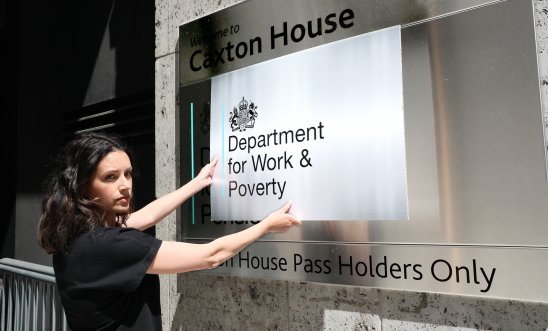
Press releases
UK: DWP's 'unhealthy obsession' with AI discriminates against people with disabilities

Report finds DWPs use of AI traps disabled people, those in poverty and the digitally excluded in ‘bureaucratic limbo’
The report highlights how intrusive data practices have led to disproportionate monitoring of disadvantaged communities
‘Have some form of sort of compassion, make the forms and things easier’ - Claimant
‘While people struggle to make ends meet and put food on the table due to inadequate social security, the DWP is still spending millions of pounds on costly, experimental systems designed to profile and surveil claimants’ - Imogen-Richmond Bishop
People with disabilities, limited digital skills, digital illiteracy, serious health concerns, or living in poverty are being pushed into bureaucratic limbo and subjected to immense stress caused by the Department for Work and Pensions (DWP) unchecked roll-out of technologies, Amnesty International said today in a new report.
The 67-page report, “Too Much Technology, Not Enough Empathy”, exposes how the DWP’s constant cycle of testing, deploying, and withdrawing costly artificial intelligence (AI) and digital systems for Universal Credit and Personal Independence Payment (PIP) has created an inaccessible and exclusionary social security system – disproportionately harming the most marginalised.
The tech-driven systems for applications and management are causing relentless dehumanisation and psychological distress for people already struggling to meet their basic needs. These systems are accompanied by intrusive data collection, resulting in excessive surveillance and profiling of disadvantaged groups – contributing to the emergence of an all-seeing state.
Prime Minister Keir Starmer has called for the UK to become an ‘AI superpower,’ with plans to accelerate AI across the public sector in a bid to boost economic growth.
Imogen-Richmond Bishop, Amnesty International Researcher on Technology, Economic, Social and Cultural Rights, said:
“The DWP’s mission to reduce ‘costs’ is an unhealthy obsession and overreliance on flawed technology. But urgent questions remain: Is the tech rollout truly cost-effective – or simply cutting corners at the expense of vulnerable people?
“With the UK’s National Audit Office expressing serious doubts about these technologies, it’s deeply concerning that while people struggle to make ends meet and put food on the table due to inadequate social security, the DWP is still spending millions of pounds on costly, experimental systems designed to profile and surveil claimants,”.
‘Dehumanising and discriminatory’
The report follows Amnesty’s earlier publication this year, ‘Social Insecurity’, which found the UK’s social security system to be “consciously cruel”, with widespread dehumanisation and discrimination. It revealed significant barriers to access:
-
64% of the welfare advisors said it was difficult or very difficult to obtain information on Universal Credit;
-
68% said the same for PIP 58% for Employment Support Allowance
-
52% of claimants reported similar difficulties in accessing social security support.
Digital exclusion is not fixed. People may experience it to varying degrees, and it can fluctuate based on factors such as living conditions, education, health, and income.
Furthermore, limited access to digital technologies, including the internet or internet connected devices, and their affordability are key factors contributing to digital exclusion caused by the DWP’s systems. Language barriers and excessively long wait times on telephone services offered for UC claimants add a strain, often resulting in significant psychological stress.
For one of the claimants interviewed by Amnesty, literacy level, gender, and socio-economic status all represented barriers to her being able to access services online.
One claimant told Amnesty: “Have some form of sort of compassion, make the forms and things easier. I mean, I'm quite illiterate. I mean, a lot of women are, are men of my age, can't use them […] So they're stuffed. They send me. Letters on my phone. I can't open them. So I ring up. I can't open it. I haven't got an iPad. I can't afford an iPad.”
Imogen Richmond-Bishop added:
“The DWP’s experimentation with tech systems has reduced people to data points, where the success of a claim often depends more on fitting into rigid digital categories than actual eligibility.
“Technology in this instance has oversimplified people’s complex realities by creating narrow and opaque processing that demeans people’s needs especially when they are unable to get the support from a human case worker that they need.
“The DWP’s data collection practices are alarmingly invasive and deeply opaque. Requiring applicants to surrender vast amounts of sensitive personal data - including health, disability, housing, marital status, and detailed financial records like bank statements – raises serious red flags. This excessive data harvesting calls into question the proportionality, legality, and fairness of how information is collected, processed and potentially exploited.”
The UK must ensure AI doesn’t contribute to human rights violations and Amnesty is calling for:
-
The UK authorities to carry out a full independent, and impartial review of the digital systems used by the DWP and scrap any that violate human rights;
-
AI regulation to ensure it doesn’t contribute to human rights violations;
-
Digital systems to be transparent, explainable and never mandatory;
-
Mandatory accessible, equal, non-digital alternatives for those who cannot rely on digital means.
The report interviewed 783 people between October 2024 to January 2025.